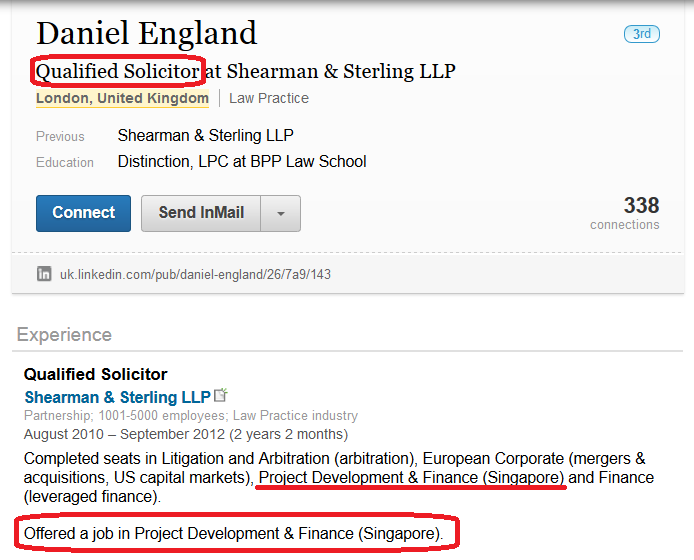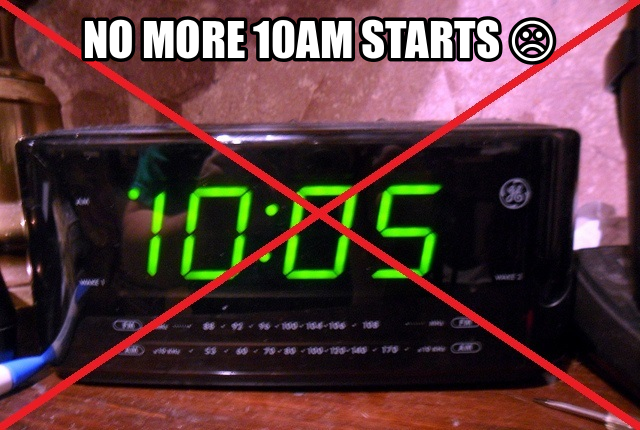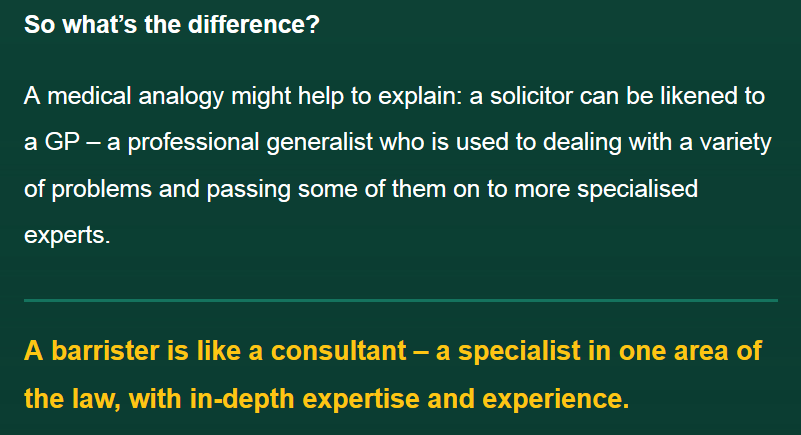Corporate lawyers pride themselves on being able to swan into work late. The trade off, of course, is that they tend to leave late. Unfortunately for Hogan Lovells' Shanghai-based lawyers, this is an attitude that enrages the punctual Brit at the office's helm...
![no-more-10am-starts]()
In an email leaked to US blog Above the Law yesterday – reproduced below in full – Hogan Lovells' Shanghai office chief Andrew McGinty writes that fee-earners' "remuneration takes account of the fact that there will be times when they need to work long hours to meet client deadlines or expectations. Therefore there will be no automatic right for fee earners to arrive late the day after late working..."
McGinty, a steely expat who dragged himself to the pinnacle of corporate law from a lowly start at Leeds Met, adds: "I am usually in by 9 am every day and will be doing my own visual checks...yesterday morning the office looked almost deserted at that time (with apologies to those who were here) which is simply not acceptable."
HOGAN LOVELLS — ANDREW MCGINTY — EMAIL RE: PUNCTUALITY
Dear all,
We are still experiencing major issues with staff punctuality. The Shanghai partners have decided that we will continue to operate the daily report system as before but will not circulate the report to all members of the Shanghai Office but will circulate the record to all the partners and XXXX. [She] will note all those arriving after the required time, and will notify the responsible partners whenever anyone arrives late a certain number of times within a month (regardless of the reasons). If these absences are found to be excessive and not justifiable on reasonable grounds, those people will be spoken to and warned. If there is insufficient improvement after the warning, an internal review will be conducted and disciplinary measures may be imposed. Persistent non-justifiable lateness will henceforth be included as a factor that will be considered in relation to internal promotions, appraisals, pay reviews and renewal of contract decisions.
XXXX will still complete the report by 9:15am each work day morning. Please let her know before 9am if you will not be in the office by 9am and, if so where you are and when/what you expect to return to the office. If the reason for your absence is “running errands”, please specify whether it is for personal or for business purposes. In all case, an expected return time is required, otherwise it will be recorded as “no explanation”.
The Shanghai partners take the view that fee-earning staff are expected to manage their own time in a professional manner and that their remuneration takes account of the fact that there will be times when they need to work long hours to meet client deadlines or expectations. Therefore there will be no automatic right for fee earners to arrive late the day after late working and any late arrival due to late working or non-business-related reasons will be with the agreement of a supervising partner (not necessarily myself). Where a late arrival has been approved, you should report to XXXX “coming in at xxhrs with agreement of [Name of Partner]“. For those fee earners who intend to arrive at 9am on any given day but find that they will arrive shortly after 9am due to transportation issues or otherwise, they should still report the reason to XXXX, but this will be recorded as a late arrival and you should adjust your transportation arrangements accordingly to prevent a reoccurrence. Where you have a business-related reason this should be reported as before e.g. “Attending BritCham seminar” and will not be recorded as a late arrival.
For support staff, they are expected to be in at 9 am every workday morning, but they are also entitled to claim overtime payment where they are required to work late.
The following policy will apply to support staff unless otherwise agreed by a partner:
(a) where the overtime ends after 11 pm but before midnight, you are allowed to come to the office by 10 am the next morning;
(b) where the overtime ends after midnight but before 2 am, you are allowed to come to the office by 11 am the same day;
(c) where the overtime ends after 2 am, you are allowed to come to the office by 12 pm midday the same day
These times and requirements are firm and are meant to be strictly adhered to. XXXX will be checking to ensure that support staff and fee earners comply with the above requirements. Where a partner agrees to any late arrival arrangement with a fee earner or with any member of the support staff outside the scope of (a) (b) or (c) above, it should be copied to XXXX. If you have a pre-scheduled appointment with a doctor or hospital or an annual health check-up, then you do not need to seek approval from a partner, but should let your supervising partner or Jennifer know in advance as well as reporting to XXXX. In return for everyone making a real effort to improve their punctuality, the partners will strive to show flexibility and understanding in one-off exceptional cases or genuine unpredictable emergencies, which would generally not count as a late arrival. What is not acceptable is a pattern of lateness without reasonable justification.
Please make travel and other arrangements that allow you to meet these requirements. If you need to put in place on-going (i.e. not one off) special working arrangements due to the need for child care or otherwise, please discuss with a partner. The new policy does not impact on the legal rights of those who are entitled by law to special working hours arrangements or your statutory entitlement to sick leave.
I am usually in by 9 am every day and will be doing my own visual checks (as will other partners and XXXX) – yesterday morning the office looked almost deserted at that time (with apologies to those who were here) which is simply not acceptable.
If you have any questions above the new policy, please speak to myself, XXXX or your main supervising partner.
Andrew



















































